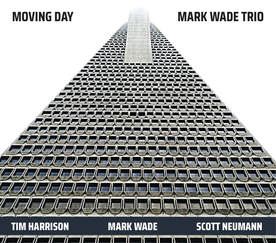
Maybe that’s why I love the Jazz trio as much as I do. In a trio, the rhythm section is, in fact, the whole band.
Mark Wade is an exemplary bassist who has been called on by the finest musicians in New York City and everywhere else. The relationships he establishes with both drummers and pianists is something beautiful. He can provide melody and harmony, poetry and propulsion, and move seamlessly between.
His debut album, Event Horizon, Mark introduced the trio of Tim Harrison on piano, Mark himself on bass, and Scott Neumann on drums. Mark proved even then that this was not simply a piano trio; Mark could step to the fore and do it effortlessly and elegantly. On Moving Day, Mark’s second album, he brings the same trio along for the continuing journey.
Moving Day the album opens with the title track, a Wade original. The piano and bass open the piece with light cymbal touches highlighting the bass line and piano arpeggio. A sweet melody emerges delicately in a riveting 6/4 time signature. It has to be said, I was hooked from the start and had to fight the impulse to just hit repeat over and over.
The piece—indeed the whole album—is so incredibly well-balanced. I was taken with everyone’s performance and with the remarkable symmetry and rapport between the three.
Wide Open follows next Neumann’s cymbals giving a brief opening before Wade and Harrison kick in. The piece, another Wade original, is an exercise in discipline and drive as they shift between 3/4, 4/4, and 7/4. This is a great ride! Wade’s lead is fantastic as Harrison and Neumann follow brilliantly. This tune is tight.
The Bells is vivid in its imagery of French church bells. There is a touch of Debussy that is almost intoxicating. In fact, as Sammy Stein points out in the liner notes, Mark has three strands to this melodic cord: Debussy’s La Mer, a bit of a seascape interlude, and the sounds of the Nice church bells. Gorgeous.
Dizzy Gillespie’s A Night in Tunisia is bent to Mark’s will as he picks up or drops beat to create Another Night in Tunisia. The melody is unmistakable but the rhythm shakes loose on its own. Scott Neumann turns in a grand drum solo as Harrison and Wade beat the melody like back-alley mugging. It has exquisitely raw moments and I just can’t get enough.
Something of a Romance is set free from the restrictions of specific time signatures where love is given free rein. Harrison plays a gorgeous lead and Mark punctuates the melody with his own lead before handing it back to Harrison’s fine piano. There is a delicacy, even a fragility, in the song that—seriously—made me want to go take my Nicole in my arms and not let her go. Sweet.
Joseph Kosma’s Autumn Leaves is one of those great exercises in Jazz harmony. Mark takes the straightforward chord progressions and reworks them beautifully in his own expression of the piece. This isn’t Nat King Cole’s Autumn Leaves, especially as Herbie Hancock’s Maiden Voyage is worked into the tune. Wonderful.
Midnight in the Cathedral creates a rather haunting image with the echoing cymbals and hollow melodies. While Mark imagines all the music played in the cathedral over the decades, even centuries, the feeling of a racing heart in the dark stillness is palpable. Then Mark and Harrison transform the number into a bit of a send-up of the Dies Irae (Day of Wrath) from the Latin Requiem Mass. It is intense. It is driven. It fills one’s head with scenes of “Sunday morning, creeping like a nun.”
The scene and mood changes with The Quarter is a rollicking homage to New Orleans with the snappy 4/4 and general funkiness. Mark kicks down Bourbon Street in the liveliest way. The bass lines and the straight-ahead drumming is as evocative of Louisiana as Midnight is of an old church.
The album beautifully concludes with In the Fading Rays of Sunlight. The resonance between the trio is stunning. Maybe it was just in the title but it made me think of Thelonious Monk’s Crepuscule with Nellie with its cool turns and splashes of brightness. What a way to end an album.
The album, the trio, Mark Wade, none of them disappoint. In an album that started with bright hope, Moving Day leaves you with satisfied fulfillment and great, great joy.
~Travis Rogers, Jr. is The Jazz Owl
 RSS Feed
RSS Feed
